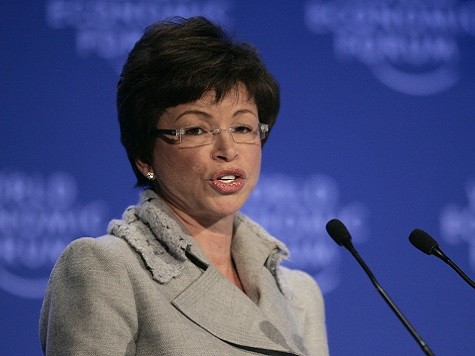Last week, the Times of Israel reported that senior presidential adviser Valerie Jarrett had been leading talks with Iran in secret for a year before the formal negotiations in Geneva this month. While the White House denied the report “100 percent,” the existence of back-channel talks has been confirmed by other reporting. The Wall Street Journal reported Sunday that President Barack Obama had “personally overseen” the talks.
Almost anything “personally overseen” by the President Obama is likely to bear the heavy stamp of Ms. Jarrett, who is the president’s closest adviser, despite a shocking track record of failure. In foreign policy, her most important mistake was her effort to dissuade the president from proceeding with the raid on Osama bin Laden. It was one of the few times that President Obama overruled her counsel–and one of his few successes.
Jarrett’s involvement in Iran is cause for concern for three additional reasons–two minor and one major. One minor reason is that she was born there. That should not automatically disqualify anyone, of course, any more than being born in the Soviet Union would have disqualified an anti-Soviet dissident. But Jarrett was born in 1956 to American expatriates in the aftermath of the CIA-assisted coup that deposed Mohammad Mossadegh.
The Iranian regime remains obsessed with the Mossadegh coup as proof of America’s innate evil–and for decades, some Americans have felt a sense of post-colonial guilt about it. That feeling may be particularly acute for an American born in the shadow of that event. The temptation to show contrition by acceding to Iran’s goals, as a kind of restorative justice, could well shape Jarrett’s involvement, and Obama’s approach.
The second minor reason to worry about Jarrett’s involvement in Iran is her political background. Her entrée into the world of left-wing politics in Chicago was through her father-in-law, Vernon Jarrett, a journalist with somewhat radical views. Jarrett spoke out against antisemitism in the black community, for example, but also took anti-Israel stands, accusing pro-Israel Jews of “support of genocide” in the Lebanon War, for example.
These two reasons for concern are fairly minor, because they are based on mere speculation, and would have to be balanced out by other factors, such as Ms. Jarrett’s personal associations with leaders of the pro-Israel community in Chicago. But the major reason for concern about her role is simply that Jarrett has banished, and repulsed, most of the Obama administration’s most competent appointees from the White House.
One of the most important departures was that of Dennis Ross, who was brought into the White House early in the Obama presidency to advise the president on the Middle East. Ross, who advocated a tough approach to Iran, is widely thought to have been marginalized by the president’s inner circle. He left the White House in 2011, ostensibly because he had only promised to serve two years, but likely because he was not being utilized.
Finally, it is worth noting that Jarrett, despite her expatriate origins, has little experience in international affairs, and is said to manage Obama’s policies through a domestic political lens. If she was as involved in the talks as reports suggest, that could be a major reason for the president’s eagerness to sign almost any deal, even one the French rejected as too weak. In any other administration, she likely would have been ignored.

COMMENTS
Please let us know if you're having issues with commenting.